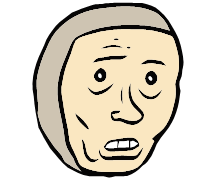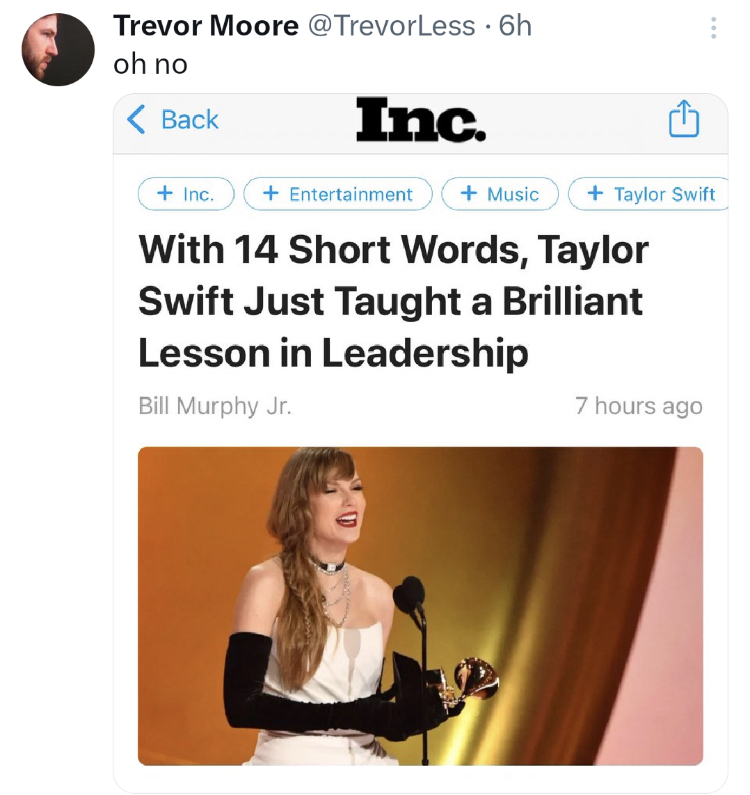The word "leadership" is pure ideology, it is a concept with zero rigor that urges us to accept that some people are inherently better than others and deserve their elevated position in society.
memes
dank memes
Rules:
-
All posts must be memes and follow a general meme setup.
-
No unedited webcomics.
-
Someone saying something funny or cringe on twitter/tumblr/reddit/etc. is not a meme. Post that stuff in !the_dunk_tank@www.hexbear.net, it's a great comm.
-
Va*sh posting is haram and will be removed.
-
Follow the code of conduct.
-
Tag OC at the end of your title and we'll probably pin it for a while if we see it.
-
Recent reposts might be removed.
-
No anti-natalism memes. See: Eco-fascism Primer
I'd push back on that, some people are better leaders than others and in a pinch there will always be people who are better able to guide a group through a challenging situation. Of course the people promoted as "leaders" under capitalism are more like petty tyrants than actual leaders. Most great leaders I know IRL are working class people who genuinely care about others and will help out without any expectations for a reward
It seems like "leadership" combines a bunch of different skills like being a good spokesperson, or a good organizer, or a good strategist that don't necessarily have to reside in the same person. You do need all those skills gathered somewhere like an executive committee, though.
"Leader" is a word invented by the bourgeois class to replace "noble" as a justification for their position at the apex of a pyramidal society. It's such a universal concept that in Spanish, they only started using "líder" as a loanword in the past few decades.
Most great leaders I know IRL are working class people who genuinely care about others and will help out
I don't understand what concept you're trying to convey. Is a leader a person who exhibits a display of class? Is a leader someone who cares about someone else? Is a leader someone who helps other people? Or are you using the example to describe an opposite, that a leader is someone who enriches themself at the expense of others?
I have a good idea of what a spokesperson is. And what a parliamentarian is. And what a teacher is. And what a strategist is. I have no fucking clue what a "leader" is.
leader is just literally a person who leads, it could be dictatorial or democratically.
you are being very strange right now
It's a strange world.
Can you describe what skills the Youth Leadership Conference teaches?
The word has been deeply abused, please don't act like it hasn't.
Liberals co-opting the word leadership doesn't discredit the concept of leaders.
People like Mao, who led the outnumbered Chinese Red Army through the 9000km Long March to keep the revolution alive.
People like Che and Fidel, who arrived in Cuba with a starting force of merely 80 men and managed to liberate Cuba from the US backed Batista
People like John Brown who yearned for the freedom of all and was willing to die for it.
The concept of leaders may be tainted by liberals because they desire people who can maximise profit. But leaders who can channel and direct the latent grievances of the wretched of the earth into action against the forces of oppression are vital to the progress of humanity.
True leadership can be the difference between fascism and liberation.
John Brown and Mao and Fidel and Che were all commanders*. Perhaps also figureheads. Mao and Che were excellent theorists; John Brown and Fidel were particularly inspiring spokesmen. If you were to make radial graphs of each executive, they'd be drastically different.
Fidel and Che spoke a language that didn't have the word "leader" in it and certainly did not include the concept of "leadership". I don't know Chinese well enough to make any conclusions about it.
John Brown revised a lot of his ideas away from overall subordination of children in an era where patriarchy was particularly strong.
*Command in war is one place where there is a stratified authority across the board, rather than in just one domain. Perhaps that is why so many First Nations would separate the role of war chief from other forms of authority.
I guess my point here is that the component parts of "leadership" are a lot more useful than the blanket concept. Maybe in centuries past, education and development would have been so limited that one person could be the best at all these parts... maybe. But these days, examining the blind spots of our language and culture, and using anthropology and linguistics and biology and other sciences to inform our politics, could be the difference between a movement faltering and succeeding.
This is why the left has so few leaders… and the government assassination and incarceration
Having one "leader" that you roll all the executive functions or skills of power into, and who just does all those things while a bunch of "followers" do none of those things, is imbalanced and vulnerable.
If you have 1 leader, the government or counter-revolutionaries can easily assassinate, incapacitate, blackmail, bribe, or compromise that leader, and you can kiss your progress goodbye. If you have a council of the highest roles in different domains that are distributed amongst several people, it's much harder to compromise, the payoff is less, and a compromised figure is almost automatically replaced.
Having one "leader" that you roll all the executive functions or skills of power into, and who just does all those things while a bunch of "followers" do none of those things, is imbalanced and vulnerable.
ideology, even in the most stratified socialist society the position of 'leader' is very democratic
I suppose I'm using "leader" as a rough synonym for organizer, in that they are able to motivate other people toward a goal and direct collective action
But is that really one unitary thing, or is it like the concept of intelligence, where there are a lot of different measurable capacities that all get rolled into one, and we think about it as one single concept because we are accustomed to using the word for that concept?
Isn't that just how words work? Most concepts can be broken down into component concepts
Some concepts, not all. I'd say not even most.
We start out in the dark and we make associations between things and this develops our understanding. Eventually we can put a picture together from all the linkages, or reach a true elementary foundation. But we don't start from knowledge.
Sometimes we have words for things, like ether and phlogiston, that are based on our assumptions and work for a little while as heuristics, but further and rigorous investigation reveals that they were inaccurate inventions of our own minds.
Anyone who's acquired a second language, or been immersed in a different nation's culture, or studied anthropology, learns that there are some things that don't carry over very well. It's the concepts that are neither universal nor quantifiable nor specific that I look into as candidates for dissolving.
In the associations I’ve worked with, all committees and boards have a designated ‘leader’. The role of a leader is to know how everyone is doing, to resolve internal conflicts, to organise and direct the meetings and to take over any task of a member who is not able to fulfil theirs. I would say that a good leader has a somewhat high emotional intelligence and has a broad skillset in order to be able to take over other peoples tasks. The leader is usually the one who puts in the most energy because ideally they are on top of everything that’s going on.
I’ve seen a lot of people doing a terrible job at it though because they think that their job is to just be assertive and motivate the other members to do their tasks, which is what the media often describes as ‘good leadership’.
I'd be willing to bet those boards also had a "secretary" and a "vp/co-chair" and a "treasurer" and possibly other positions, because "the one person who runs everything in the organization" is both too much for one person to handle, and doesn't allow people to specialize as well.
You have described a "leader" as a Social Connector, a Conflict Resolver, a Parliamentarian, and a Generalist. Why should these all be one person, instead of separate people, so they can all do a better job of their thing?
they think that their job is to just be assertive and motivate the other members to do their tasks, which is what the media often describes as ‘good leadership’.
Sounds like there are many divergent and incompatible definitions of "leader" and "leadership".
Thinking about the Cabinet of the executive branch also informs my thinking. Joe Biden is a perfect example of how all the departments would run just fine without him. Yet he is the foremost leader in the land.
You make good points, I can see how an organisation can work with the tasks I described subdivided into equal roles. And it might be more democratic that way. To me it doesn’t discredit the meaning of the word leader though. Words often don’t have a single definition that works for everyone, and I agree that this word has lost its meaning in general. But in the associations I mentioned the word does have a clear meaning as I described. So in some contexts I do think it makes sense to use it.
dude some people are better at some things, while others are better at different things
some people can lead, others can put together space shuttles
you are being very strange
 "We have been implicitly accepting the idea of 'nobility' that has no demonstrable empirical basis in reality."
"We have been implicitly accepting the idea of 'nobility' that has no demonstrable empirical basis in reality."
 "People are better at different things. Some people are fit to rule, others are fit to put together cathedrals."
"People are better at different things. Some people are fit to rule, others are fit to put together cathedrals."
Broke: From each according to need, to each according to ability.
Woke: Actually, everybody is exactly the same.
Broke: Ruthless critique of all that exists.
Woke: ...except for the idea of "leadership", which I am particulary attached to.
When we say that experience and reason prove that men are not equal, we mean by equality, equality in abilities or similarity in physical strength and mental ability.
It goes without saying that in this respect men are not equal. No sensible person and no socialist forgets this. But this kind of equality has nothing whatever to do with socialism.
V. I. Lenin, someone who implicitly accepted the idea of nobility.
Can you point out where in my comment(s) that I made any assertion at all of congruency amongst humans?
I am making an argument about class and how we think of class. I am saying that the synthetic idea of "leadership" (as opposed to its standalone components) underlies the structure of class society.
Also, physical aptitude is multiple things, and mental ability is multiple things. But I'd give Lenin a free pass on that one because psychology, physiology, and kinesiology were much more rudimentary back then.
After actually thinking this through, I can see that you are right. "Leadership" is only harped on about by authoritarians and is only useful for stifling non-hierarchical organization structures.
When I was a little kid, a few students in my cohort were selected for a "leadership camp". I never knew what went on there. How did they practice leadership without any followers at the camp? Were some of them secretly invited to be followers? Do I have to listen to them when they get back?
I was sent to one of those.
I don't know the answers to any of those questions either.
Which makes more sense?
- a distinct skillset of oratory
- a distinct skillset of abstract thinking about objectives and outcomes (strategy)
- a distinct skillset of teaching
- a distinct skillset of managing dialogue
- a distinct skillset of coordinating people in real time
- a distinct skillset of mediating and resolving disputes between group members
- Leadership, which is some mishmash of all or any or none of the above, we say it's a skill but there are no good tests or even any quantitative metrics of it
I can say for certain that none of the leadership things I've been roped into have been about any of the things you listed under #1.
Maybe "abstract thinking about objectives and outcomes" but that appears to be more, like, a thing that justifies "leaders" existing, rather than something they actually do. If I start actually talking about that sort of thing with leaders they get weird about it.
To back you up, Owl, most of these "leadership" programs are grifts; something along the line of "pay us money so you can think about what it would be like to be in charge," with a light dash of networking. The USian concept of leadership seems to start and end at having enough money and influence to own a business or organization.
Comrade, do not let the liberal desire for middle managers that boost the bottom line taint the concept.
Those whose passion and unwavering loyalty to the people earn their place, they are not inherently better due to blood or class.
Ho Chi Minh, who led a revolution not just against the Japanese Empire, but the French and American Empires, too.
Lenin, who led the Bolsheviks to victory to establish the great Soviet Union.
Sankara, whose short tenure liberated Burkina Faso.
Leaders are able to inspire and direct the fury of the proletariat to a better future with charisma, knowledge and integrity. It's easy for greedy to be corrupted, it's easy for the cowardly to surrender, it's easy for the unwise to be defeated. It is difficult to sacrifice comfort to fight for a slight chance at liberation.
Against overwhelming odds, leadership is necessary to survive, let alone emerge victorious.
None of those people lived in a vacuum, their success is, like all things, circumstantial and influenced primarily by the work and effort of other people. Yes, Lenin did a lot of good, but we focus on him primarily because he was just coincidentally in the position that granted the most attention. Nothing he did could have been done without the work of hundreds of party members other than himself.
Do not confuse criticism of leadership as a concept with criticism of organizers. Someone who is more willing and more able to organize people together is a very real phenomenon, as with all skills; but “leadership” implies an elevated position, a worthiness above the average person. This is not real, because like all conceptions of worth, we made it up.
Pictured below Bill Murphy Jr.

14 words?
"My Daddy paid for my career" is just 6.
What am I missing?
yeah what is the point here?
the only person here who realized they were missing something!
Apparently I'm not well versed in fascist dog whistles. I was never really around those sorts of people
not that you know of anyway
"Just start on third base and your future will roll out the red carpet."
I think we are safe because "existence" is not a short word
